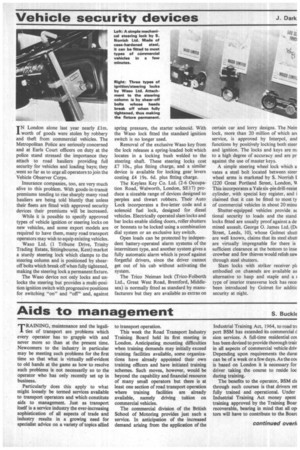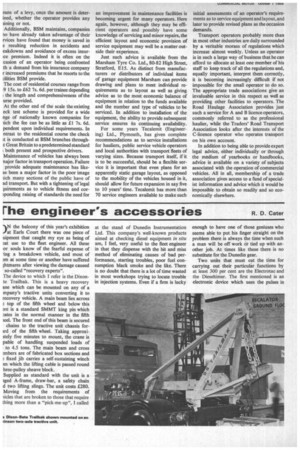Aids to management S. BucklE T RAINING, maintenance and the legalities
Page 49

Page 50

If you've noticed an error in this article please click here to report it so we can fix it.
of transport are problems which every operator has to grapple with and never more so than at the present time. Newcomers to the industry in particular may be meeting such problems for the first time so that what is virtually self-evident to old hands at the game as how to resolve such problems is not necessarily so to the operator who has only recently set up in business.
Particularly does this apply to what might loosely be termed services available to transport operators and which constitute aids to management. Just as transport itself is a service industry the ever-increasing sophistication of all aspects of trade and industry results in a growing need for specialist advice on a variety of topics allied to transport operation.
This week the Road Transport Industry Training Board held its first meeting in London. Anticipating mounting difficulties when training demands may initially exceed training facilities available, some organizations have already appointed their own training officers and have initiated training schemes. Such moves, however, would be beyond the capability and financial resource of many small operators but there is at least one section of road transport operation where training facilities are already available, namely driving tuition on commercial vehicles.
The commercial division of the British School of Motoring provides just such a service. In anticipation of the increased demand arising from the application of the Industrial Training Act, 1964, to road trE port BSM has extended its commercial d sion services. A full-time residential cot has been devised to provide thorough trair in all aspects of commercial vehicle driv Depending upon requirements the durai can be of a week or a few days. As the col is based on London it is necessary for driver taking the course to reside loc during training.
The benefits to the operator, BSM elf through such courses is that drivers ret fully trained and operational. Under Industrial Training Act money spent training approved by the Training Boar. recoverable, bearing in mind that all op tors will have to contribute to the Boarc
cans of a levy, once the amount is determed. whether whether the operator provides any titling or not.
Additionally, BSM maintains, companies lo have already taken advantage of their rvices have found that money is saved in e resulting reduction in accidents and eakdowns and avoidance of excess incurice premium. Indeed it is often on the casion of an operator being confronted th a demand from his insurance company r increased premiums that he resorts to the rilities BSM provide.
The cost of residential courses range from ,9 15s. to £62 7s. 6d. per trainee depending the length and comprehensiveness of the urse provided.
At the other end of the scale the existing eck test scheme is provided for a wide nge of nationally known companies for tich the fee can be as little as £1 7s. 6d. pendent upon individual requirements. In ntrast to the residential course the check ;t is conducted at BSM branches throughLt Great Britain to a predetermined standard both present and prospective drivers. Maintenance of vehicles has always been najor factor in transport operation. Failure provide adequate maintenance has likese been a major factor in the poor image fich many sections of the public have of ad transport. But with a tightening of legal pirements as to vehicle fitness and cor;ponding raising of standards the need for an improvement in maintenance facilities is becoming urgent for many operators. Here again, however, although they may be efficient operators and possibly have some knowledge of servicing and minor repairs, the efficient layout and economic provision of service equipment may well be a matter outside their experience.
Just such advice is available from the Marsham Tyre Co. Ltd., 80-82 High Street, Stratford, EIS. As distinct from manufacturers or distributors of individual items of garage equipment Marsham can provide drawing and plans to meet individual requirements as to layout as well as giving advice as to the most economic balance of equipment in relation to the funds available and the number and type of vehicles to be serviced. In addition to installation of the equipment, the ability to provide subsequent service ensures its continuing availability.
For some years Tecalemit (Engineering) Ltd., Plymouth, has given complete recommendations as to service installations for hauliers, public service vehicle operators and local authorities with transport fleets of varying sizes. Because transport itself, if it is to be successful, should be a flexible service it is important that even plans for an apparently static garage layout, as opposed to the mobility of the vehicles housed in it, should allow for future expansion in say five to 10 years' time. Tecalemit has more than 70 service engineers available to make such initial assessments of an operator's requirements as to service equipment and layout, and later to provide revised plans as the occasion demands.
Transport operators probably more than in most other industries are daily surrounded by a veritable morass of regulations which increase almost weekly. Unless an operator is in such a large way of business that he can afford to allocate at least one member of his staff to keep track of all the regulations and, equally important, interpret them correctly, it is becoming increasingly difficult if not impossible for the small operator to do so. The appropriate trade associations give an invaluable service in this respect as well as providing other facilities to operators. The Road Haulage Association provides just such a service for A and B licence operators, commonly referred to as the professional haulier, while the Traders' Road Transport Association looks after the interests of the C-licence operator who operates transport on his own account.
In addition to being able to provide expert legal advice, either individually or through the medium of yearbooks or handbooks, advice is available on a variety of subjects associated with the operation of commercial vehicles. All in all, membership of a trade association gives access to a fund of specialist information and advice which it would be impossible to obtain so readily and so economically elsewhere.




















































































































